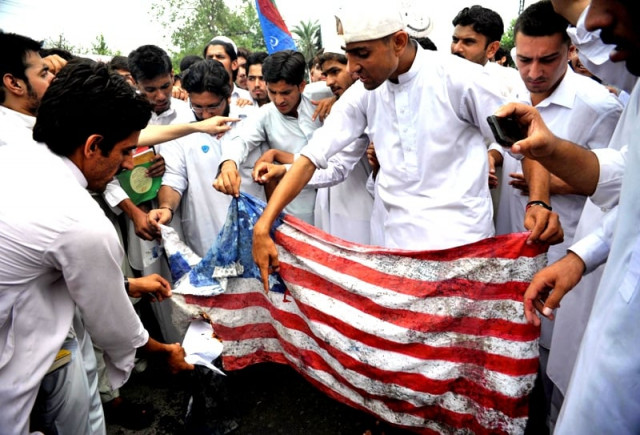Pakistan requests Interpol to criminalise ‘sacrilegious material’
The move is aimed at lowering religious tensions across the globe.

Pakistan requests Interpol to criminalise ‘sacrilegious material’
Pakistan has requested the world’s largest police organisation, Interpol, to draft legislation which would effectively block “sacrilegious materials” available on the internet. The move came in the wake of the anti-Islam film ‘Innocence of Muslims’ on YouTube, which has sparked violence across the Muslim world.
Officials told The Express Tribune on Monday that a formal request has been sent to the Interpol secretary general. The aim of the request, according to the officials, is to decrease religious tensions across the globe.
“Interpol may work out a draft legislation to effectively counter such moves by criminals, which disturbed interfaith harmony and ultimately hurt world peace,” reads a letter the interior ministry sent out to Interpol Secretary General Ronald K Noble.
Interior Minister Rehman Malik requested Noble to take up the matter with major search engines to ensure the removal of such materials. Interpol should urge member countries to draft a new law which would help internet operators in blocking all anti-Islamic matter on the internet, saying that all such material was highly detrimental to the ‘war on terror’, Malik observed.
A draft proposal may be placed before the upcoming meeting of the UN General Assembly to be held in Rome, according to ministry officials.
Previously, a global legal agreement which criminalises any insult to Islam and other religions, similar to that proposed by the interior ministry, has been sought by the 57-nation Organisation of Islamic Cooperation (OIC) at the UN Human Rights Council, now meeting in Geneva.
Every year for more than a decade until 2010 the council, where Pakistan is the OIC spokesperson, or its predecessor committee, as well as the UN General Assembly, passed majority resolutions on resolutions proposed by the OIC.
But these were not converted into an international agreement because of fierce opposition from the United States, European and some Latin American countries, who argued it would violate free speech and the UN’s Universal Declaration of Human Rights.
Following diplomatic negotiations spearheaded by the US when the administration of President Barack Obama brought it into the council and support for the project waned, the OIC dropped its campaign two years ago.
“It certainly looks as though they (the OIC) might aim to use this furore over a video everyone recognises is stupid and pathetic to try to relaunch the ‘defamation’ campaign,” said one Western diplomat who asked not to be named.
WITH ADDITIONAL INPUT FROM REUTERS
Published in The Express Tribune, September 18th, 2012.



















COMMENTS
Comments are moderated and generally will be posted if they are on-topic and not abusive.
For more information, please see our Comments FAQ